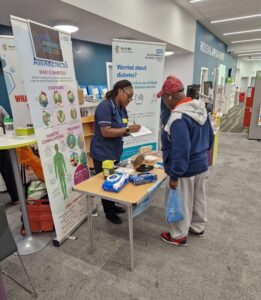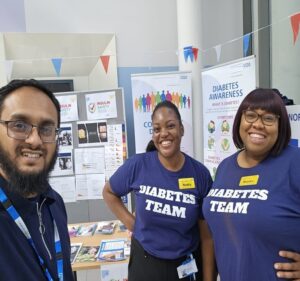Diabetes Week (10-16 June) is an opportunity to raise awareness about diabetes, what it is, and the work happening across North Central London to support those with diabetes and prevent more people from developing the condition.
You can also find out more about Diabetes Awareness Week by visiting the Diabetes UK website.
What is Diabetes?
Diabetes is a condition that causes a person’s blood sugar level to become too high. There are 2 main types of diabetes:
- type 1 diabetes – a lifelong condition where the body’s immune system attacks and destroys the cells that produce insulin
- type 2 diabetes – where the body does not produce enough insulin, or the body’s cells do not react to insulin properly
Type 2 diabetes is far more common than type 1. In the UK, over 90% of all adults with diabetes have type 2.
What is NCL Health and Care doing to tackle diabetes?
There is a huge amount of work happening across North Central London to both treat and prevent diabetes. From providing extra investment to reverse type 2 diabetes in the most affected communities in NCL, to walk-in sessions to prevent communities from developing diabetes in the first place.
Case study: Enfield Community Diabetes Service
 The Enfield Community Diabetes Service was set up to support residents and patients with diabetes. Offering free checks on blood pressure and blood sugar, as well as group sessions on managing diabetes and advice on nutrition, this project engaged with the community in various settings from churches to local community hubs over the course of two years.
The Enfield Community Diabetes Service was set up to support residents and patients with diabetes. Offering free checks on blood pressure and blood sugar, as well as group sessions on managing diabetes and advice on nutrition, this project engaged with the community in various settings from churches to local community hubs over the course of two years.
This project was delivered through the NCL Inequalities Fund Programme, an annual fund of £5m that was set up to tackle deeply entrenched inequalities across Barnet, Camden, Enfield, Haringey, and Islington.
Sessions were also launched to engage with groups with specific needs (e.g. translation services). This includes groups from Somali, Turkish, Black and South Asian communities. Strong community engagement in the project enabled members of the public to have better access to diabetes health care professionals, education about diabetes and self-management, and links to clinical and social care.
Insight
Sessions were delivered in response to feedback from local communities about barriers to accessing care. Some key examples of barriers for the Turkish community in particular included:
- Long waiting times.
- Translators not always available during appointments.
- Not enough time during consultation for discussions.
- Lack of communication-about diagnosis and results.
- Fear about misdiagnosis, variation in diagnosis from NHS and Turkey.
Example session
At a Town Hall in Enfield, two GPs, a councillor and a pharmacist gave advice on healthy eating and regular health checks. The session had 64 attendees in total:
- 25 were screened
- 21 were within the normal range (4.0 to 7.0)
- 3 were found to be pre-diabetic and were given education leaflets and advised to see their GP
- 1 person with poorly controlled type 2 diabetes was given advice on diet, exercise and medication, and were advised to see their GP for an urgent review

| ‘’Thank you so much, I honestly did not know my glucose levels were high. I had no symptoms. I will speak to my GP’’ – participant |
